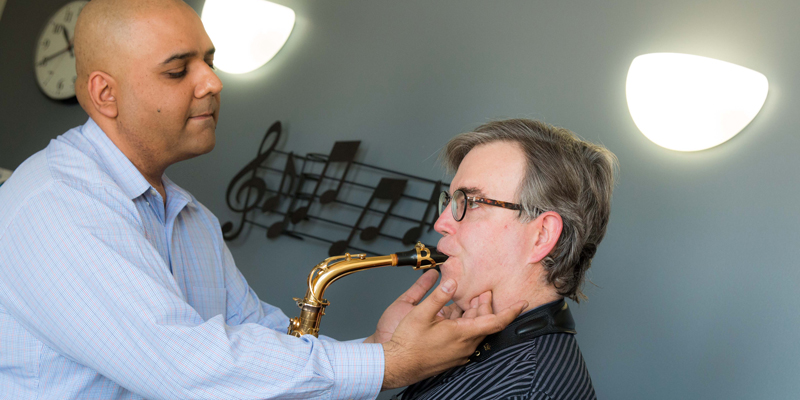A doctorate in music and medicine
By Jan Jarvis

Through a partnership with UNT Health Science Center, the University of North Texas in Denton is now offering the world’s first music doctoral degree in performing arts health.
The new concentration will focus on hearing, vocal, musculoskeletal and psychological health of musicians and other performing artists, said Sajid Surve, DO, Associate Professor of Family Medicine at UNTHSC and Kris Chesky, PhD, Professor of Music at the UNT College of Music. The two are co-directors of the Texas Center for Performing Arts Health.
Learn more about performing arts health: |
The music discipline has been undergoing a transformation over the past few years, as reflected in the Texas Education Agency’s decision to require all high school and middle school music programs in Texas to teach students about health and safety related to their specialty. The requirement makes educators responsible for informing student musicians about the health-related concepts of music-making including hearing, musculoskeletal, mental, and vocal health.
“Unfortunately, for many of these areas the quality of the research that is available to inform both educators and students is either sorely lacking or absent altogether,” Dr. Surve said. “Our new degree program seeks to fill this void by training music professionals about best research practices as well as the research needs in each of these areas, and mentoring them as they conduct high-quality studies in performing arts health.”
UNTHSC will play a significant role in the program. In addition to providing faculty, UNTHSC will offer several opportunities for doctoral candidates to contribute to ongoing projects within the School of Public Health, the Osteopathic Heritage Foundation Physical Medicine Core Research Facility, and the Department of Family Medicine. UNTHSC faculty will also have a pivotal role in mentoring candidates as they conduct their own dissertation projects.
The need for more research on medicine and the performing arts is clear. Some 95 percent of dancers injure their ankles, hips and shoulders. An estimated 89 percent of musicians experience injuries severe enough to affect their performances. Singers and actors endure a variety of injuries brought on by their work.
The doctoral degree will bring the full resources of the UNT System to address the need for research in performing arts health, Dr. Surve said.
“The music profession is in dire need of high quality evidence to help them as they train the next generation of music educators and students,” he said. “Doctoral candidates who have the skills to conduct the necessary research to fill these knowledge gaps will be able to benefit not just themselves, but the music and medical communities as a whole.”



![Uyen Sa Nguyen Scaled[58]](https://www.unthsc.edu/newsroom/wp-content/uploads/sites/16/Uyen-Sa-Nguyen-scaled58-145x175.jpg)

Social media